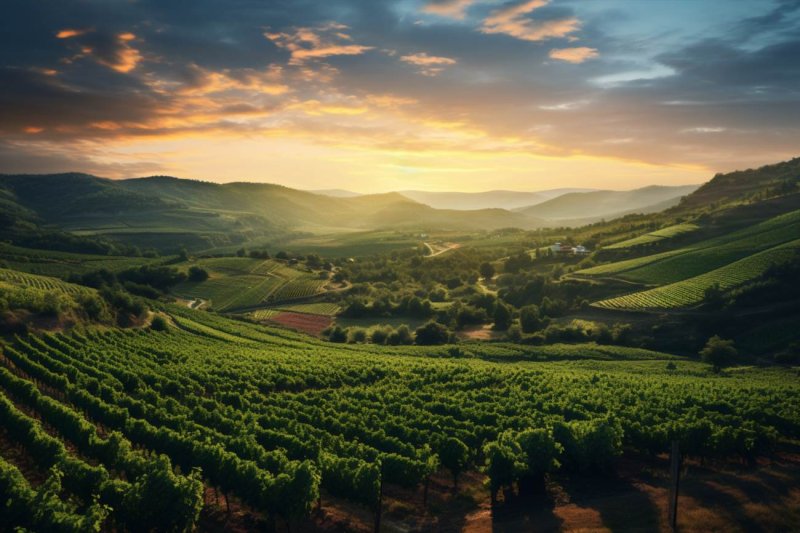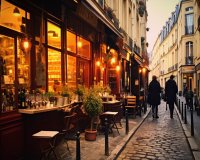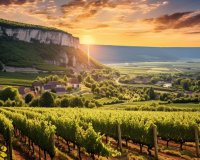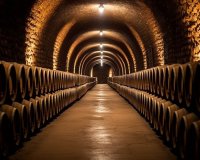Eco-Friendly Vineyards: Exploring Sustainable Winemaking in France

Eco-Friendly Vineyards: Exploring Sustainable Winemaking in France
France, renowned for its picturesque vineyards and exquisite wines, has been at the forefront of the winemaking industry for centuries. In recent years, there has been a noticeable shift towards sustainable practices in viticulture, leading to the rise of eco-friendly vineyards. This movement aims to preserve the rich terroir, protect the environment, and ensure the longevity of the wine industry.
The Essence of Sustainable Winemaking
Sustainable winemaking is more than just a trend; it's a commitment to the environment and future generations. It emphasizes minimal intervention in the vineyard and the cellar, using practices that are environmentally sound, socially responsible, and economically viable. This holistic approach ensures that the land remains fertile and productive for future vintages.
Key Practices in Eco-Friendly Vineyards
- Organic Farming: Avoiding synthetic pesticides, herbicides, and fertilizers. Instead, vineyards use natural alternatives and rely on beneficial insects and plants to maintain a balanced ecosystem.
- Biodynamic Farming: This method views the vineyard as a complete organism, using the lunar calendar and specific preparations to enhance soil and plant health.
- Water Management: Efficient irrigation systems and rainwater harvesting to reduce water waste.
- Soil Conservation: Techniques such as cover cropping and reduced tillage to prevent soil erosion and maintain soil health.
- Renewable Energy: Utilizing solar panels and wind turbines to power vineyard operations.
Eco-Friendly Vineyards in Paris
While Paris is famed for its cultural attractions, it's less known for its vineyards. However, there are pockets of viticulture within the city's boundaries, and they are making strides in sustainable winemaking.
| Vineyard |
Notable Sustainable Practice |
| Clos Montmartre |
Uses organic compost to enrich soil |
| Parc de Belleville |
Employs rainwater harvesting systems |
| Domaine de Vignes |
Practices biodynamic farming |
The Future of Sustainable Winemaking
The drive towards sustainable winemaking in France, and particularly in regions close to Paris, is a testament to the industry's commitment to the environment. As consumers become more conscious of their choices and their impact on the planet, the demand for eco-friendly wines is likely to grow. By embracing sustainable practices, vineyards not only ensure the longevity of their operations but also contribute to a greener and more resilient planet.
Conclusion
France's legacy in the world of wine is undisputed. By taking the lead in sustainable winemaking practices, it sets a global example. Eco-friendly vineyards, especially those in and around Paris, embody the spirit of innovation, respect for nature, and commitment to future generations that define the best of the French wine industry.
Explore the Champagne Region: Small-Group Tour with Wine Tasting and Gastronomic Delights
Embark on a captivating day trip from Paris to discover the charm of the Champagne region. Delve into the heart of Épernay, the epicenter of renowned champagne producers, and experience an immersive tour that promises a delightful blend of history, culture, and gastronomy.
Begin your journey with a convenient pickup from your hotel or accommodation. Dive into the rich heritage of champagne at one of the esteemed champagne houses, which may include iconic names like Moet & Chandon, Mercier, Nicolas Feuillatte, Veuve Clicquot, Taittinger, Canard Duchene, or other distinguished estates (subject to availability). Explore the ancient cellars, where the secrets of champagne-making come to life, and indulge in tastings of their finest creations.
As you traverse the picturesque vineyards, your expert guide will regale you with stories about grape varietals, terroir, and the artistry behind crafting the perfect champagne. Witness the meticulous process that transforms grapes into the effervescent delight that is cherished worldwide.
Immerse yourself in the local culinary scene with a sumptuous 3-course lunch at an authentic restaurant. Savor the flavors of France, perfectly paired with exquisite wines, enhancing your understanding of the region's gastronomic traditions.
Continue your odyssey through champagne excellence by visiting another esteemed winery. Engage with passionate vintners, learn about their unique production techniques, and indulge in tastings of their exclusive champagne varieties. By the end of the day, you'll have a profound appreciation for the nuances of Champagne, from the crisp Blanc de Blancs to the elegant Champagne rosé.
At the conclusion of this enchanting tour, revel in the memories of a day filled with extraordinary tastes and discoveries. Your adventure concludes with a drop-off back at your hotel, leaving you with a newfound appreciation for the artistry and craftsmanship behind every bubble in a champagne flute.
Includes:
- Hotel pickup and drop-off for ultimate convenience
- Comfortable transportation in an air-conditioned minivan
- Insightful driver/guide providing a wealth of knowledge
- Fascinating tours at 2 Champagne houses, each with a unique story to tell
- Immersive wine tastings, sampling the finest champagnes
- Sumptuous 3-course lunch at a local restaurant, showcasing French culinary excellence
- Up to 6 glasses of exquisite Champagne, revealing the region's diverse flavors
- Bottled water to keep you refreshed throughout the day
Important Information:
- The specific champagne house visited is subject to availability and may include renowned names like Moet & Chandon, Mercier, Nicolas Feuillatte, Veuve Clicquot, Taittinger, Canard Duchene, or others.
- Transfers and trip duration are approximate, contingent on the day's schedule and prevailing traffic conditions.
- Lunch is inclusive, featuring exquisite cuisine. Please note that beverages such as soft drinks, alcohol, and bottled water are not included.
- It is advisable to bring a jacket or an extra layer, as the cellars can be cold and damp.
- The order of activities may vary based on tour timings, ensuring a seamless and engaging experience.
Benefits of Sustainable Winemaking in Paris
Paris, the city renowned for its romance, architecture, and culture, is also part of a greater French landscape that has deep roots in winemaking. Over recent years, the trend towards sustainable winemaking practices has gained momentum, not just as a means of protecting the environment but also for ensuring the long-term viability of vineyards. This article delves into the myriad benefits that sustainable winemaking brings to Paris and the broader wine community.
1. Environmental Benefits
Sustainable winemaking practices emphasize a balanced relationship with nature. By adopting these practices, winemakers can ensure a healthier ecosystem and reduced carbon footprint.
- Soil Preservation: Sustainable practices focus on maintaining soil health, increasing its fertility, and preventing erosion. Healthy soil results in more robust vines and better grape quality.
- Water Conservation: Efficient water management systems help in reducing wastage and preserving valuable water resources.
- Biodiversity: Encouraging natural predators and minimizing chemical use helps maintain a balanced ecosystem, which is crucial for the vines' health and resilience.
2. Economic Benefits
Although transitioning to sustainable practices might seem costly initially, the long-term economic benefits are substantial.
- Reduced Costs: By minimizing chemical inputs and maximizing natural processes, winemakers can reduce costs in the long run.
- Increased Demand: With growing consumer awareness, sustainably produced wines often fetch higher prices and enjoy more demand in the market.
- Resilience to Climate Change: Sustainable vineyards, with their focus on ecological balance, are better poised to handle the challenges posed by changing climate conditions.
3. Social Benefits
Sustainable winemaking also has profound social implications. It fosters a stronger bond between communities and enhances the reputation of the region.
- Community Engagement: Sustainable vineyards often engage the local community in their operations, fostering a sense of belonging and pride.
- Healthier Work Environment: Reduced chemical use means a safer environment for vineyard workers, reducing health risks.
- Education: Many sustainable vineyards in Paris offer educational tours, enlightening visitors about the significance and methods of sustainable winemaking.
Case Study: A Parisian Vineyard's Journey
Let's take a closer look at a Parisian vineyard that embraced sustainable practices and reaped the benefits.
| Vineyard Name |
Initiative |
Outcome |
| Chateau de Paris |
Introduced drip irrigation system |
Water usage reduced by 30% |
| Chateau de Paris |
Shifted to organic fertilizers |
Improved soil health and grape quality |
| Chateau de Paris |
Community engagement programs |
Increased local tourism by 20% |
Conclusion
The shift towards sustainable winemaking in Paris signifies a forward-looking approach that recognizes the importance of harmonizing with nature. This change not only holds promises for the environment but also ensures the longevity of the winemaking tradition, economic viability, and social cohesion. As more vineyards in Paris and beyond adopt sustainable practices, the global wine industry stands to benefit immensely, promising a brighter future for all stakeholders involved.
Champagne Delights: A Day Trip from Paris
Embark on a day tour to the enchanting Champagne region, where the effervescence of French culture meets the world of sparkling wines. This small-group experience, hosted by My Winedays, promises an immersive journey filled with tastings, a gourmet lunch, and picturesque landscapes.
Your adventure begins with a pickup from your central Paris hotel or a designated meeting point in a comfortable minivan at around 7.30 AM. Indulge in delicious croissants en route as your guide shares insights into the captivating universe of champagne.
Explore a prestigious estate (Moët & Chandon, Mumm, Veuve Clicquot, Mercier, Pommery, Lanson, etc.) for a guided tour through endless galleries of sparkling wonders, concluding with a delightful tasting experience.
Next, your air-conditioned minivan takes you through the scenic vineyards, pausing for a wine expert-led tasting. Learn the intricacies of professional wine tasting amid the picturesque vineyard setting.
Savor a delectable lunch at a family-run champagne house or local restaurant, indulging in multiple glasses of champagne and ratafias paired with regional cuisine.
Following lunch, take a leisurely stroll through the vineyards of the Côte des Blancs and Vallée de la Marne, capturing breathtaking views and deepening your understanding of grape varieties.
The finale awaits at another family-run winery, where you might witness the art of sabrage or disgorgement "à la volée" and indulge in tastings of exquisite champagnes.
Your journey concludes back in Paris at the iconic Hôtel de Ville, where you'll be dropped off, enriched with newfound champagne knowledge and unforgettable memories.
What's Included:
- Hotel pickup from central Paris
- Comfortable transportation in an air-conditioned minivan
- Expert driver and guide with deep wine knowledge
- Visits to at least 2 Champagne houses
- Tasting of 8 Champagnes
- Traditional Lunch paired with Champagne
- Wine tasting led by a seasoned expert (weather permitting from April)
- Tips for an enriching experience
Important Information:
Warm clothing is advisable as caves and wine cellars can be quite cold and damp. Please inform about specific dietary requirements during booking. Minimum numbers apply, and there's a possibility of cancellation if passenger requirements are not met. The activity provider will contact you a day before the tour to arrange pickup details.
Book now to secure your spot and pay later. Gift this experience to a loved one for a memorable journey into the heart of Champagne!
Organic Production Methods in Paris
Paris, known for its iconic landmarks and romantic ambiance, is also a hub for organic agriculture and sustainable farming practices. Organic production methods in Paris are gaining momentum as people become increasingly conscious of the environment and the quality of the food they consume.
Organic farming in Paris goes beyond just growing fruits and vegetables without synthetic pesticides and fertilizers. It encompasses a holistic approach to agriculture that promotes biodiversity, minimizes environmental impact, and prioritizes the well-being of both consumers and farmers. Let's delve into some of the key aspects of organic production methods in Paris.
The Importance of Soil Health
Organic farming in Paris places a strong emphasis on maintaining healthy soil. Farmers adopt practices such as crop rotation and cover cropping to enhance soil fertility naturally. These methods not only improve the quality of the produce but also reduce the need for chemical inputs.
Moreover, organic farmers in Paris use compost and organic matter to enrich the soil, ensuring that it remains a thriving ecosystem that supports a wide range of beneficial microorganisms. Healthy soil is the foundation of successful organic farming.
Reducing Chemical Inputs
One of the defining features of organic production methods is the avoidance of synthetic chemicals. In Paris, organic farmers prioritize natural pest control and disease management techniques. They often use beneficial insects, companion planting, and other biological methods to keep pests in check.
By eliminating or significantly reducing the use of chemical pesticides and herbicides, organic farming not only safeguards the health of consumers but also protects the environment and reduces the risk of chemical runoff into water bodies.
Supporting Biodiversity
Organic farms in Paris act as sanctuaries for biodiversity. These farms encourage the coexistence of various plant species, which, in turn, supports a diverse range of wildlife. Birds, insects, and other creatures find a home in these thriving ecosystems, contributing to the overall health of the environment.
By avoiding monoculture and embracing diversity, organic production methods play a vital role in preserving the delicate balance of nature while producing high-quality, nutritious food.
Local and Sustainable Practices
Parisians are increasingly turning to locally sourced and sustainable food options. Organic farms in and around Paris provide a steady supply of fresh, seasonal produce to local markets and restaurants. This not only reduces the carbon footprint associated with food transportation but also supports local farmers and the regional economy.
Furthermore, many organic farms in Paris implement sustainable water management practices to conserve this precious resource. Techniques like rainwater harvesting and efficient irrigation methods help reduce water wastage while ensuring the health of crops.
Certification and Consumer Trust
For consumers in Paris, trust is paramount when it comes to organic products. To address this, organic farms and products often undergo rigorous certification processes. These certifications, such as "AB" (Agriculture Biologique), assure consumers that the products meet specific organic standards and have been produced using sustainable practices.
By adhering to these standards and obtaining certification, organic producers in Paris not only build trust with their customers but also contribute to the growth of the organic sector in the region.
Conclusion
Organic production methods in Paris are not just a trend; they are a sustainable way of farming that benefits the environment, consumers, and local communities. Through practices that prioritize soil health, reduce chemical inputs, support biodiversity, and promote sustainability, Paris is leading the way in embracing organic agriculture. As the demand for organic products continues to rise, these methods are set to play an increasingly vital role in Paris's food system.







